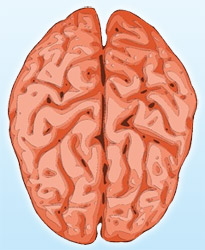
A new study has found that the problems, faced by a large number of women approaching menopause that are termed as memory slips, are genuine.
The research won't be a surprise to the millions of women who have had suffered forgetfulness or who complains about "brain fog" in their late 40s and 50s at their time of menopause.
The scientists at the University of Rochester Medical Center and the University of Illinois at Chicago who gave women a rigorous array of cognitive tests, validate their experiences and offer some clues about happening in the brain as women approach menopause.
"The most important thing to realize is that there really are some cognitive changes that occur during this phase in a woman's life," Miriam Weber, Ph.D., the neuropsychologist at the University of Rochester Medical Center and leader of the study has been quoted as saying.
"If a woman approaching menopause feels she is having memory problems, no one should brush it off or attribute it to a jam-packed schedule.
"She can find comfort in knowing that there are new research findings that support her experience. She can view her experience as normal."
It is one of the few studies that emphasizes on analyzing in detail a woman's brain function during menopause and matches it with the findings to the woman's own reports of memory or cognitive problems faced during problems.
The study was conducted on 75 women, aged 40 to 60, who were hitting menopause.
A series of cognitive test were conducted on the women that included several skills like capabilities to learn and retain new information, to mentally handle new information, and to sustain their attention over time.
Questions related to menopause symptoms were also asked. The women were quizzed about depression, anxiety, hot flashes, and sleep difficulties. Their blood levels of the hormones estradiol and follicle-stimulating hormone were measured.
The team of researcher found that women's complaints were largely related to some types of memory problems, but not others.
Women who had memory complaints were much more likely to do poorly in tests designed to measure what is called "working memory" - the ability to take in new information and manipulate it in their heads.
These kinds of tasks in real life might include calculating the sum of a tip after a restaurant meal, adding up a series of numbers in one's head, or adjusting one's itinerary on a trip when they have to change flight.
The team of researchers also observed that the women's complaints of memory problems were linked with a decreased ability to keep and focus attention on a difficult task. These tasks include calculating the taxes, maintaining sharp attention on the road during a long drive, completing a detailed report at work despite boredom, or getting through a particularly challenging book.
Weber the lead researcher of the study observed that such cognitive processes aren't what often come to mind when people think of "memory."
Generally, people consider memory to be the ability to reproduce a piece of information, such as a grocery item you need to remember to buy, and to retrieve it when required.
The team of researchers found little evidence that women have difficulty with this ability. Weber observed that the 75 women in the study were more highly educated and on average of higher intelligence than the general population, and a drop might have been difficult to find out.
Women who complained of memory problem were also more likely to complain about depression, anxiety, and sleep disorders. The team did not observe any correlation between memory problems and hormone levels.
In General, anywhere from one-third to two-thirds of women approaching menopause reported forgetfulness and other difficulties which is as per them is linked to poor memory.
"If you speak with middle-aged women, many will say, yes, we've known this. We've experienced this," Weber, assistant professor of Neurology has been quoted as saying.
"But it hasn't been investigated thoroughly in the scientific literature.
"Science is finally catching up to the reality that women don't suddenly go from their reproductive prime to becoming infertile. There is this whole transition period that lasts years. It's more complicated than people have realized."
Co-author Pauline Maki, Ph.D., director of Women's Mental Health Research in UIC's Department of Psychiatry, asserted that people are surprised to know that evidenced does not prove that memory complaints are linked to real memory deficits."
"Menopausal women are different. They are good at rating their memory skills.
"We don't know why but perhaps it's because their memory changes are more sudden and they are aware of other changes that accompany the menopause, like hot flashes. This might help them to better assess their mental abilities," Maki has been reported saying.
The journal Menopause, the journal of the North American Menopause Society has published this study.
--with inputs from ANI
|
|
Read More: North Goa | Lady Harding Medical College | Medical College | Gsvm Medical College | Medical College Po | B.r.d Medical College | Mlb Medical College So | Medical Campus | Govt. Medical College | Gandhi Medical College | Madras Medical College | Kilpauk Medical College | Thanjavur Medical College So | Pariyaram Medical College | Calicut Medical College Mdg | Alappuzha Medical College | R.g.kar Medical College Po | North Bengal University So | Assam Medical College | Silchar Medical College | M.g.m Medical College


Comments: